Слайд 2

Use the right form of Personal Pronoun in the sentence: We
asked Jim to stay with … in our house.
Слайд 3

We asked Jim to stay with us in our house.
Слайд 4

Use the right form of Personal Pronoun in the sentence: Do
you know that lady? Yes. I know ….
Слайд 5

Do you know that lady? Yes. I know her.
Слайд 6

Use the right form of Personal Pronoun in the sentence: That
is his book. Give … to him.
Слайд 7

That is his book. Give it to him.
Слайд 8

Use the right form of Personal Pronoun in the sentence: Spend
more time with your son. … is so lonely.
Слайд 9

Spend more time with your son. He is so lonely.
Слайд 10

Use the right form of Personal Pronoun in the sentence: The
bag is heavy. What is there in …?
Слайд 11

The bag is heavy. What is there in it?
Слайд 12

Use the right form of Personal Pronoun in the sentence: Look
at them. … are playing like kids.
Слайд 13

Look at them. They are playing like kids.
Слайд 14

Use the right form of Personal Pronoun in the sentence: Is
he a doctor? - No, … is not.
Слайд 15

Is he a doctor? - No, he is not.
Слайд 16

Use the right form of Personal Pronoun in the sentence: Are
you a student? Yes, … am.
Слайд 17

Are you a student? Yes, I am.
Слайд 18

Use the right form of Personal Pronoun in the sentence: Mike
has many friends. He likes ….
Слайд 19

Mike has many friends. He likes them.
Слайд 20

Use the right form of Personal Pronoun in the sentence: Is
Henry at home? Can I speak to …?
Слайд 21

Is Henry at home? Can I speak to him?
Слайд 22

Use the right form of Personal Pronoun in the sentence: Can
I help …? Yes, please I’ve lost my way.
Слайд 23

Can I help you? Yes, please I’ve lost my way.
Слайд 24

Use the right form of Personal Pronoun in the sentence: Mary
and Jane are sisters, aren’t …?
Слайд 25

Mary and Jane are sisters, aren’t they?
Слайд 26

Use the right form of Personal Pronoun in the sentence: My
mother fell asleep because … was tired.
Слайд 27

My mother fell asleep because she was tired.
Слайд 28

Use the right form of Personal Pronoun in the sentence: We
know … well. They are our friends.
Слайд 29

We know them well. They are our friends.
Слайд 30

Use the right form of Personal Pronoun in the sentence: Tell
… your name, please.
Слайд 31

Tell me your name, please.
Слайд 32

Use the right form of Possessive Pronoun in the sentence: Mary
washed … hands and face.
Слайд 33

Mary washed her hands and face.
Слайд 34

Use the right form of Possessive Pronoun in the sentence: Ann
likes to laugh. … face is always merry.
Слайд 35

Ann likes to laugh. Her face is always merry.
Слайд 36

Use the right form of Possessive Pronoun in the sentence: They
have a new flat. … flat is not very big.
Слайд 37

They have a new flat. Their flat is not very big.
Слайд 38

Use the right form of Possessive Pronoun in the sentence: What’s
… phone number? May I phone you?
Слайд 39

What’s your phone number? May I phone you?
Слайд 40

Use the right form of Possessive Pronoun in the sentence: Give
me … photo and I’ll give you mine.
Слайд 41

Give me your photo and I’ll give you mine.
Слайд 42

Use the right form of Possessive Pronoun in the sentence: Where
are … friends now?
Слайд 43

Where are your friends now?
Слайд 44

Use the right form of Possessive Pronoun in the sentence: Here
is a postcard from … friend Peggy.
Слайд 45

Here is a postcard from my friend Peggy.
Слайд 46

Use the right form of Possessive Pronoun in the sentence: She
lives in Australia now with … family.
Слайд 47

She lives in Australia now with her family.
Слайд 48

Use the right form of Possessive Pronoun in the sentence: …
husband works in Newcastle.
Слайд 49

Her husband works in Newcastle.
Слайд 50

Use the right form of Possessive Pronoun in the sentence: …
company builds ships.
Слайд 51

His company builds ships.
Слайд 52

Use the right form of Possessive Pronoun in the sentence: …
children go to school in New York.
Слайд 53

Their children go to school in New York.
Слайд 54

Слайд 55

My husband and I want to go to Australia, too.
Слайд 56

Use the right form of Possessive Pronoun in the sentence: We
want to see Ann and … family next winter.
Слайд 57

We want to see Ann and her family next winter.
Слайд 58

Use the right form of Possessive Pronoun in the sentence: Autumn
has come. I like … beauty.
Слайд 59

Autumn has come. I like its beauty.
Слайд 60

Use the right form of Possessive Pronoun in the sentence: He
has a bad memory. He can’t remember even … own name.
Слайд 61

He has a bad memory. He can’t remember even his own
name.
Слайд 62

Use the right form of Possessive Pronoun in the sentence: I’ve
got relatives in England. … aunt lives in Guildford.
Слайд 63

I’ve got relatives in England. My aunt lives in Guildford.
Слайд 64

Use the right form of Possessive Pronoun in the sentence: Charles
is going to a picnic with … girlfriend.
Слайд 65

Charles is going to a picnic with his girlfriend.
Слайд 66

Use the right form of Possessive Pronoun in the sentence: Are
you satisfied with … marks, Mark?
Слайд 67

Are you satisfied with your marks, Mark?
Слайд 68

Use the right form of Possessive Pronoun in the sentence: Sally
and I like Mathematics. It’s … favorite subject.
Слайд 69

Sally and I like Mathematics. It’s our favorite subject.
Слайд 70

Use the right form of Possessive Pronoun in the sentence: There
is a mouse under the table. I can see … tail.
Слайд 71

There is a mouse under the table. I can see its
tail.
Слайд 72

Use the right form of Possessive Pronoun in the sentence: …
flat is on the third floor.
Слайд 73

Our flat is on the third floor.
Слайд 74

Use the right form of Demonstrative Pronoun in the sentence: This
is my book, … is yours. Take it.
Слайд 75

This is my book, that is yours. Take it.
Слайд 76

Use the right form of Demonstrative Pronoun in the sentence: At
… moment he is very busy. Phone in twenty minutes, please.
Слайд 77

At this moment he is very busy. Phone in twenty minutes,
please.
Слайд 78

Use the right form of Demonstrative Pronoun in the sentence: …
was a sad story. Everybody kept silence for some time.
Слайд 79

That was a sad story. Everybody kept silence for some time.
Слайд 80

Use the right form of Demonstrative Pronoun in the sentence: I’ll
take that book, I don’t like … one. Give it to me.
Слайд 81

I’ll take that book, I don’t like this one. Give it
to me.
Слайд 82

Use the right form of Demonstrative Pronoun in the sentence: These
flowers are mine. …are his.
Слайд 83

These flowers are mine. Those are his.
Слайд 84

Use the right form of Demonstrative Pronoun in the sentence: Have
you read … letter? – Not yet.
Слайд 85

Have you read this letter? – Not yet.
Слайд 86

Use the right form of Demonstrative Pronoun in the sentence: …
suits are more suitable for young persons. They don’t suit me.
Слайд 87
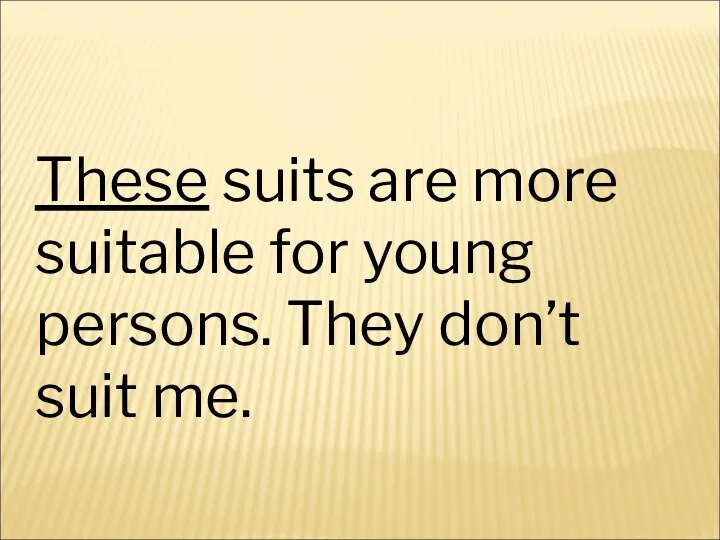
These suits are more suitable for young persons. They don’t suit
me.
Слайд 88
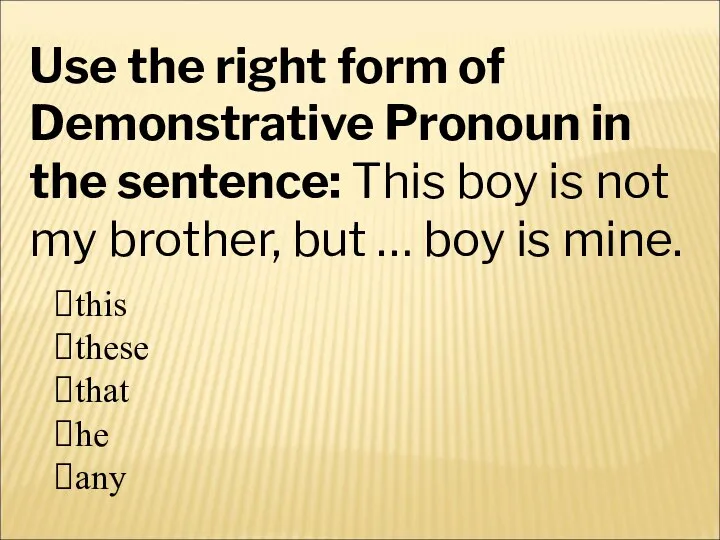
Use the right form of Demonstrative Pronoun in the sentence: This
boy is not my brother, but … boy is mine.
Слайд 89
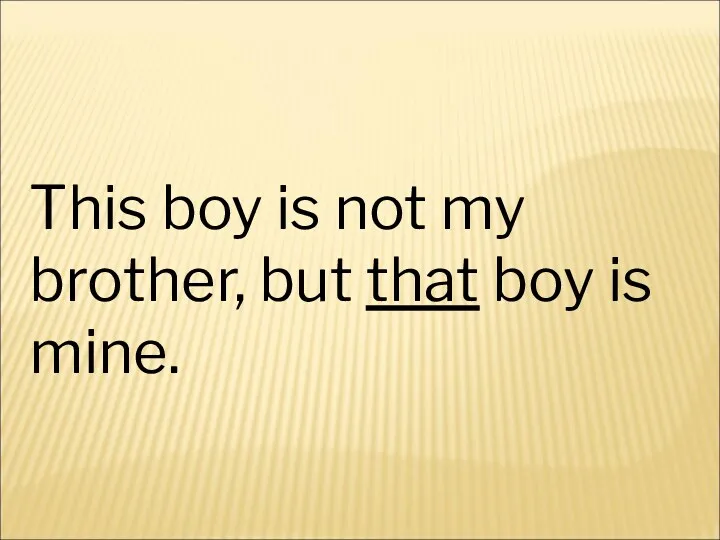
This boy is not my brother, but that boy is mine.
Слайд 90
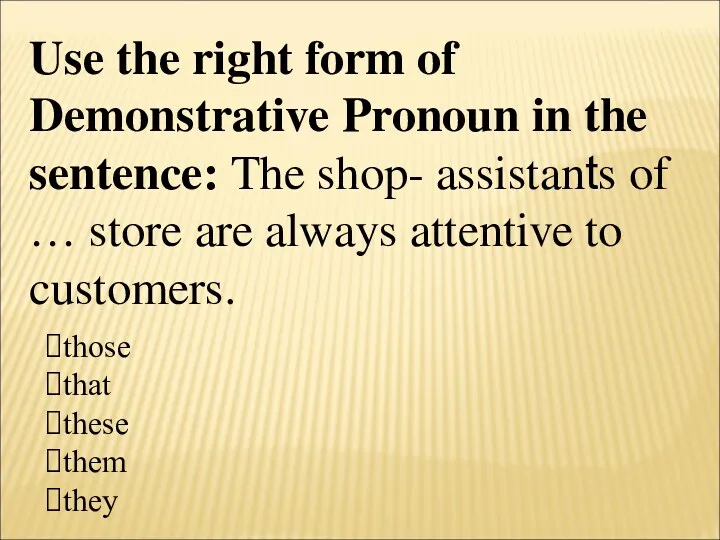
Use the right form of Demonstrative Pronoun in the sentence: The
shop- assistants of … store are always attentive to customers.
Слайд 91

The shop- assistants of that store are always attentive to customers.
Слайд 92
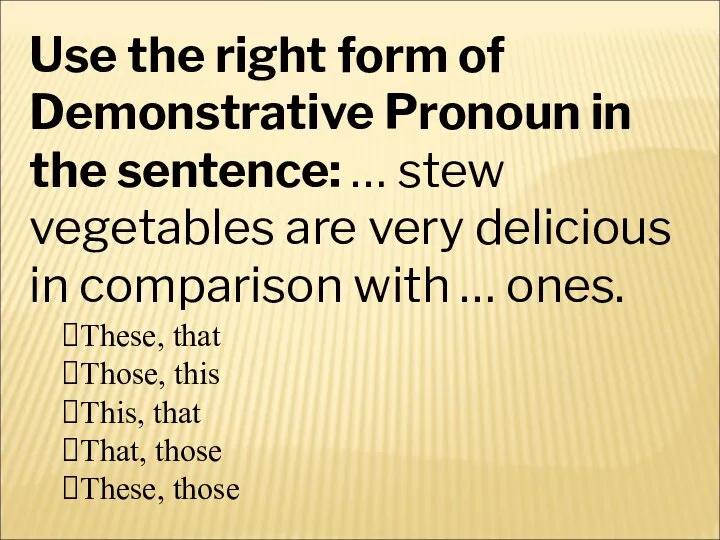
Use the right form of Demonstrative Pronoun in the sentence: …
stew vegetables are very delicious in comparison with … ones.
Слайд 93

These stew vegetables are very delicious in comparison with those ones.
Слайд 94
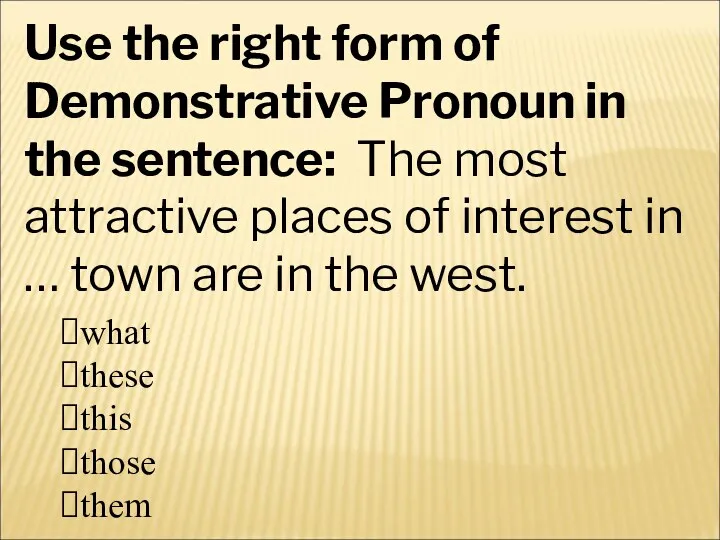
Use the right form of Demonstrative Pronoun in the sentence: The
most attractive places of interest in … town are in the west.
Слайд 95

The most attractive places of interest in this town are in
the west.
Слайд 96
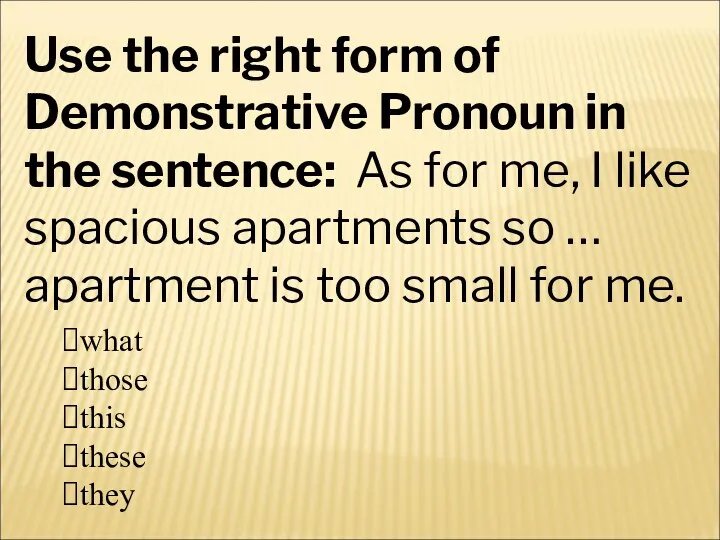
Use the right form of Demonstrative Pronoun in the sentence: As
for me, I like spacious apartments so … apartment is too small for me.
Слайд 97
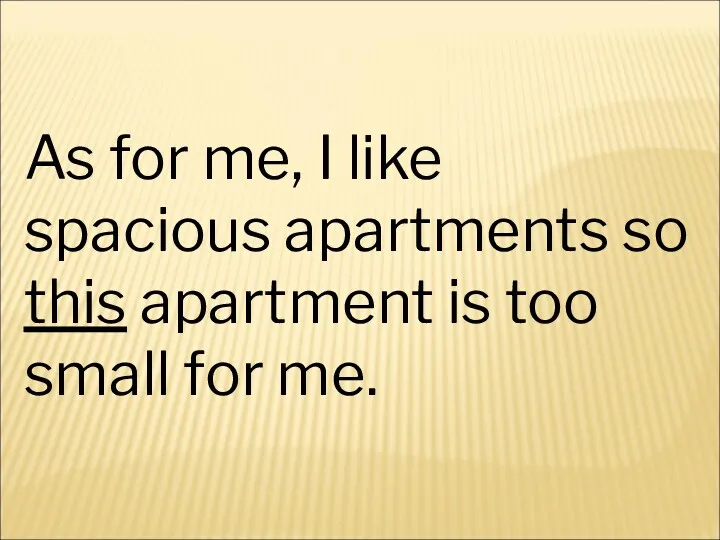
As for me, I like spacious apartments so this apartment is
too small for me.
Слайд 98
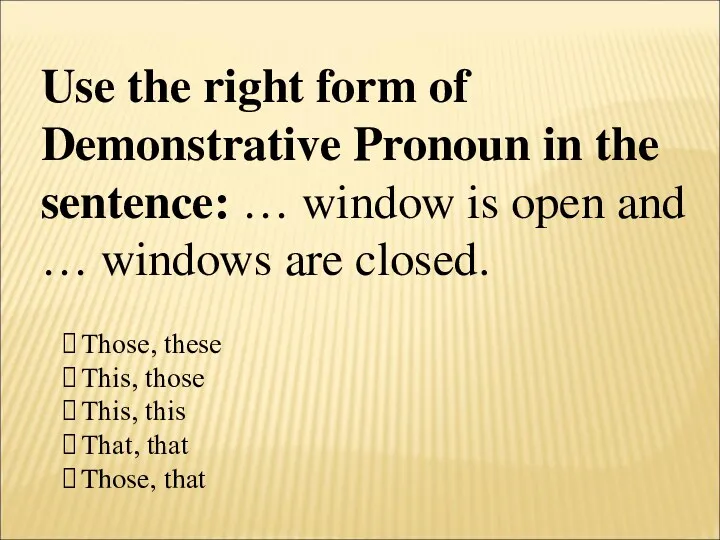
Use the right form of Demonstrative Pronoun in the sentence: …
window is open and … windows are closed.
Слайд 99

This window is open and those windows are closed.
Слайд 100
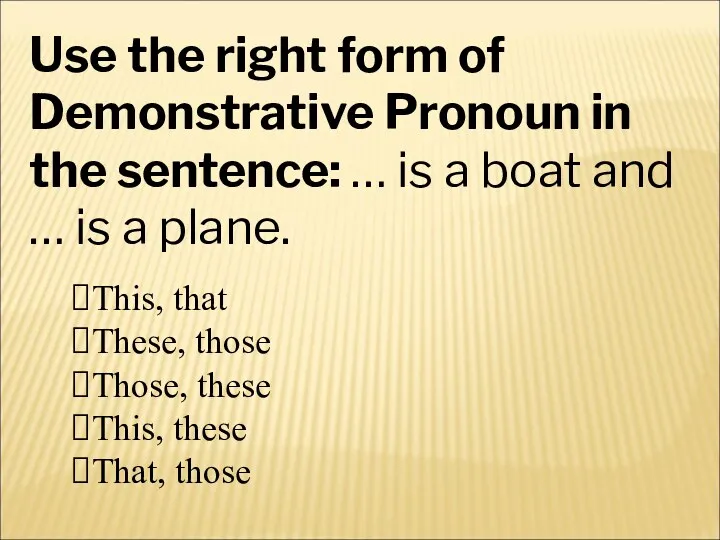
Use the right form of Demonstrative Pronoun in the sentence: …
is a boat and … is a plane.



































































































 What is the weather like in Britain?
What is the weather like in Britain? Условные выражения на английском языке
Условные выражения на английском языке Tour in Georgia
Tour in Georgia Grammar
Grammar ОГЭ Speaking
ОГЭ Speaking Present Perfect or Past Simple
Present Perfect or Past Simple How to become a global student
How to become a global student Traditional British Meals
Traditional British Meals The past simple (indefinite) tense
The past simple (indefinite) tense What is Rocket?
What is Rocket? Sport in USA
Sport in USA Was. Were
Was. Were Theoretical Phonetics of the English Language
Theoretical Phonetics of the English Language Intercultural Communication Theories
Intercultural Communication Theories In harmony with myself
In harmony with myself Подготовка к сдаче ЕГЭ по английскому языку. Раздел Говорение. Задание 44
Подготовка к сдаче ЕГЭ по английскому языку. Раздел Говорение. Задание 44 Balance Sheet
Balance Sheet My holidays
My holidays Animals Of Russia
Animals Of Russia Простые времена (Simple Tenses). Лекция №2
Простые времена (Simple Tenses). Лекция №2 Flags and countries. Continents
Flags and countries. Continents Cooking actions
Cooking actions The best place in world. London
The best place in world. London Keep fit and healthy
Keep fit and healthy New South Wales is a state on the east coast of Australia
New South Wales is a state on the east coast of Australia Great Britain
Great Britain Animals. Hidden picture
Animals. Hidden picture Reported speech. Intermediate level
Reported speech. Intermediate level